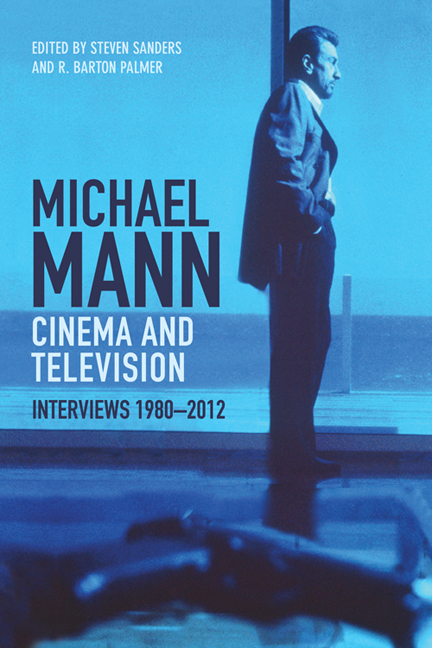Book contents
- Frontmatter
- Contents
- List of Illustrations
- Acknowledgements
- Introduction: Michael Mann in His Interviews
- 1 Four Minute Mile
- 2 Castle Keep
- 3 Of Vice and Mann
- 4 Manhunter: An Interview with Michael Mann
- 5 Michael Mann: Hollywood Writer–Director–Producer
- 6 Mann and His Movies
- 7 All the Corporations’ Men
- 8 Smoking Gun
- 9 “Ali Likes the Film a Lot. He's Seen it Six Times”
- 10 Paint it Black
- 11 Mann Among Men
- 12 L.A. Belongs to the Coyotes
- 13 Michael Mann Interview
- 14 A Mann's Man's World
- 15 Number One with a Bullet
- 16 The Study of Mann
- Chronology
- Filmography
- Publisher's Acknowledgments
- Index
16 - The Study of Mann
Published online by Cambridge University Press: 05 September 2016
- Frontmatter
- Contents
- List of Illustrations
- Acknowledgements
- Introduction: Michael Mann in His Interviews
- 1 Four Minute Mile
- 2 Castle Keep
- 3 Of Vice and Mann
- 4 Manhunter: An Interview with Michael Mann
- 5 Michael Mann: Hollywood Writer–Director–Producer
- 6 Mann and His Movies
- 7 All the Corporations’ Men
- 8 Smoking Gun
- 9 “Ali Likes the Film a Lot. He's Seen it Six Times”
- 10 Paint it Black
- 11 Mann Among Men
- 12 L.A. Belongs to the Coyotes
- 13 Michael Mann Interview
- 14 A Mann's Man's World
- 15 Number One with a Bullet
- 16 The Study of Mann
- Chronology
- Filmography
- Publisher's Acknowledgments
- Index
Summary
Thieves, assassins, mad men, whistle-blowers, and gamblers have all populated the extreme adventures of Michael Mann's films. For more than 30 years, with style and precision, he has examined the richness of human experience.
Chicago born and raised, Michael Mann was majoring in English literature at the University of Wisconsin when a screening of G.W. Pabst's The Joyless Street moved him to want to become a director. Discovering Stanley Kubrick's Dr. Strangelove at a local theater later that same year closed the deal. He entered the London Film School in 1965, then crossed to Paris as a film correspondent for NBC television to cover the May 1968 student uprisings. He returned to the U.S. in 1971 and made his first mark in television, writing for Starsky & Hutch and directing Police Woman and a number of movies for television, culminating in The Jericho Mile (1979), which won a DGA Award and was released to critical acclaim as a theatrical feature in Europe.
While learning the ropes, Mann was saving his money and building his own production company. His successful TV work in the 1980s – Miami Vice and Crime Story – afforded him the autonomy to choose only those projects that most excited him. Asked recently how he was able to maintain creative control over his first theatrical feature, Thief (1981), he replied: “Easy. I cut the checks.”
In all, he has directed ten features, creating a body of work that is abundantly energetic in its precision and variety, from the psychologically layered crime film Heat (1995), to the historical epics The Last of the Mohicans (1992) and Public Enemies (2009), to an all-American study of corruption, The Insider (1999).
Most recently, Mann directed the pilot and is the executive producer of the new HBO horse racing series Luck. We caught up with him at his Santa Monica-based production company, in his office filled with skyscrapers of books and art and artifacts from the many eras he's visited in his movies.
F.X. FEENEY: A lot of directors know from an early age that this is what they want to do. Did you have a life plan that you wanted to make films?
- Type
- Chapter
- Information
- Michael Mann - Cinema and TelevisionInterviews, 1980-2012, pp. 117 - 129Publisher: Edinburgh University PressPrint publication year: 2014



